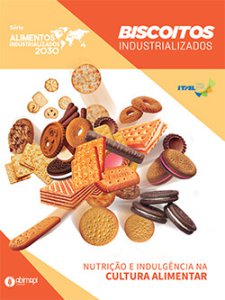NUTRITIONAL VALUE OF INDUSTRIALIZED COOKIES
Generally, cookies are products with low calories value, as their raw material are wheat, fat, and obviously sugar in the case of sweet cookies. A strong market trend is the launching of new alternative products with lower content of CALORIES, SUGAR, SATURATED FAT and SODIUM, so that significant changes are currently observed among various products, with cookies having as much contents as those with lower contents.
The cookies nutritional value varied significantly among the 243 products analyzed (61 salty cookies and 182 sweet cookies), there are many products containing relevant quantities of PROTEINS, FIBERS, VITAMINS and MINERALS. Cookies act as good vehicles to include nutrients and functional substances, as they are safe products from the microbiological point of view, with a long shelf-life, as they are dough products with dissemination at homes of different social-economical classes and has great acceptance in all the age f=ranges.
PROTEINS
The content of PROTEIN in cookies, even with the variations among the considered items, are very significant for the consumers feeding and nutrition. It is possible to check that many products can be classified as a source of proteins.
DIETARY FIBERS
The content of FIBERS, even with the variations among the considered items, are very significant for the consumers feeding and nutrition. It is possible to check that many products can be classified as a source of FIBERS, while some can have a high content of dietary fibers, both per portion of 30 g as for 100 g.
VITAMINS and MINERALS
A small quantity of sweet cookies have a voluntary statement of VITAMINS and MINERALS on the nutritional label. Among them, there are cookies that can be considered as source of calcium, iron, zinc and vitamins B1, B2, B3, B6 and C, per portion of 30 g, or with high content of these minerals and vitamins, per 100 g.
CALORIES (ENERGY VALUE)
Generally, cookies, mainly sweet cookies, can not be considered as products of low caloric content, considering the average content of 212 Kcal of portions of 50 g. However, the quantities of calories vary among the different types of cookies available in the market.
CARBOHYDRATES
Most of the products meet up to, at least, 10% of the recommended daily needs of 300 g of CARBOHYDRATES.
SUGAR
The statement for sugar content was identified in 20 cookies from the sample of 182 sweet cookies. The quantity of sugar vary significantly according to the type of product, with the lowest value observed for a topped cookie (4.0 g/portion of 100 g) and the highest for a filled cookie (46.7 g/portion of 100 g).
SATURATED FATS
Generally, the quantities of SATURATED FATS in cookies vary a lot among the different types of products, there are products containing from 0.0 g to 6.0 g, in portions of 30 grams.
SODIUM
It was not identified any product with low SODIUM, which is natural considering that they are products that use salt in their basic formulation.




